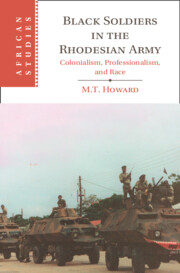Book contents
- Black Soldiers in the Rhodesian Army
- African Studies Series
- Black Soldiers in the Rhodesian Army
- Copyright page
- Dedication
- Epigraph
- Contents
- Figures
- Preface
- Acknowledgements
- 1 Introduction
- 2 The Creation of Black Rhodesian Soldiers’ Regimental Loyalties
- 3 ‘The Rhodesian Army Was the Best in Everything’
- 4 Racism and Soldierly Loyalty During the War
- 5 The Impact of the War upon Soldierly Loyalties
- 6 ‘They Just Follow the Government of the Day’
- 7 A New ‘Government of the Day’ Dawns
- Conclusion
- Bibliography
- Index
- African Studies Series
2 - The Creation of Black Rhodesian Soldiers’ Regimental Loyalties
Published online by Cambridge University Press: 01 February 2024
- Black Soldiers in the Rhodesian Army
- African Studies Series
- Black Soldiers in the Rhodesian Army
- Copyright page
- Dedication
- Epigraph
- Contents
- Figures
- Preface
- Acknowledgements
- 1 Introduction
- 2 The Creation of Black Rhodesian Soldiers’ Regimental Loyalties
- 3 ‘The Rhodesian Army Was the Best in Everything’
- 4 Racism and Soldierly Loyalty During the War
- 5 The Impact of the War upon Soldierly Loyalties
- 6 ‘They Just Follow the Government of the Day’
- 7 A New ‘Government of the Day’ Dawns
- Conclusion
- Bibliography
- Index
- African Studies Series
Summary
RAR created a particular military culture in which its troops developed powerful bonds of soldiery loyalty to their regiment. This loyalty was created through the Rhodesian Army mimicking the invented traditions of British colonial regiments, which were historically successful in creating in-group solidarity among troops. In contrast to much received opinion, recruitment to the RAR was not dependent upon either ethno-regional or familial identity, and soldiers from all over the country joined the army for myriad reasons. Masvingo catchment area became important, although not dominant, in supplying recruits. Likewise, soldiering became a metier prevalent within certain families. By the onset of the war for Zimbabwe, the RAR’s soldierly potency had been greatly enhanced by operational experience. structure and ethos of the RAR underwent significant changes at the tail end of the Federation and after the Rhodesian Front’s rise to power. In particular, a new emphasis upon the counter-insurgency doctrine learned during the Malayan Emergency indicated a shift towards being deployed on COIN tasks within Rhodesia.
Keywords
- Type
- Chapter
- Information
- Black Soldiers in the Rhodesian ArmyColonialism, Professionalism, and Race, pp. 51 - 85Publisher: Cambridge University PressPrint publication year: 2024

